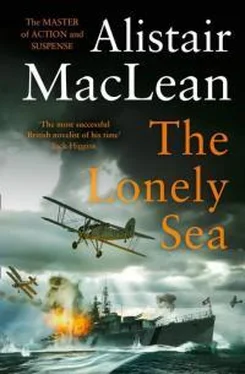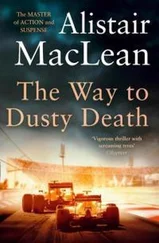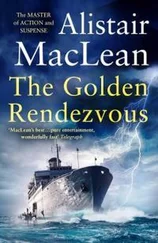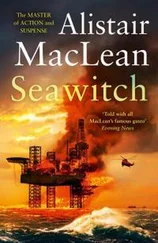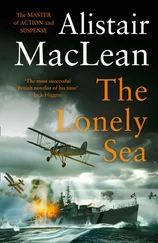And he had swum every foot of the way.
The Arandora Star had indeed fallen upon evil days. Less than a year had elapsed since the ending of her great days, the proud days when the fluttering of the Blue Star house flag at her masthead had signalled in a score of harbours all over the world the stately arrival of one of the elite of the British Mercantile Marine – a luxury cruise liner on her serene and regal way round the better ports of the seven seas.
Less than a year had elapsed since she had taken aboard her last complement of financially select passengers, wrapped them in a silken cocoon of luxury and impeccable service and transported them painlessly north to the Norwegian fjords in search of the summer sun or south to bask in the warmth of the blue Caribbean skies. Deck games, soft music, cinema shows, dancing to the ship’s band, the tinkling of ice in tall frosted glasses, the unobtrusive but omnipresent white-jacketed stewards – there had been no lack of every last comfort and convenience which might in any way conduce to the perfect shipboard holiday atmosphere of relaxation and romance.
Less than a year had elapsed, but now all that was gone. The change was great. The relaxation and romance were no more. Neither were the bands, the bars, the deck games, the dancing under the stars.
Greater even was the change in the ship itself. The hull, upper-works and funnel that had once so gaily reflected their colours in the millpond waters of fjords and Mediterranean ports were now covered in a dull coat of neutral grey. The public rooms had been stripped of their expensive furnishings, panelling and draperies, cabins and staterooms altered and fitted with crude metal bunks to accommodate twice – and in some cases four times – as many passengers as formerly.
But the greatest change of all was in the nature of the passengers, and the purpose of their voyage. Where once there had been a few hundred affluent Britons, there were now no fewer than 1,600 far from affluent German and Italian internees and prisoners of war: and they were going not in search of the sun, but to internment camps in Canada for the duration of the war.
These internees, composed mostly of British-resident civilians and captured German seamen, were the lucky ones. They were leaving the bleak austerity of blacked-out and rationed England for the comfort and comparative plenty of North America. True, they were going to be locked up and guarded for months or even years, and it was going to be a dull and boring war for them: but at least they would be well clad, well fed – and above all safe.
Or they would have been. Unfortunately, both for the Germans and their Italian allies, soon after 6.00 a.m. on 2 July, 1940, on their second day out from Liverpool and some way off the west coast of Ireland, the Arandora Star slowly swam into view, and framed herself on the crossed hairs of the periscope sights of a German U-boat’s captain.
The torpedo struck the Arandora Star fair and square amidships, erupting in a roar of sound and a towering wall of white water that cascaded down on the superstructure and upper decks, blasting its way through the unarmoured ship’s side clear into the engine room. Deep inside the ship, transverse watertight bulkheads buckled and split under the impact, and the hundreds of tons of water, rushing in through the great jagged rent torn in the ship’s side, flooded fore and aft with frightening speed as if goaded by some animistic savagery and bent on engulfing and drowning trapped men before they could fight their way clear and up to freedom.
Many of the crew died in these first few moments before they had recovered from the sheer physical shock of the explosion, their first intimation of the direction in which danger lay being a tidal wave of seething white and oil-streaked water bearing down upon them even as their numbed minds registered the certain knowledge that the one and only brief moment in which they could have rushed for safety was gone forever.
From the already flooded depths of the ship some few did manage to claw their way up iron ladders and companionways to the safety of the upper deck, to join the hundreds already there: but they had no sooner arrived than it was swiftly borne in upon them that this safety was an illusion, that their chances of being able to get clear away of the already sinking liner were indeed remote.
In the reports of the tragedy which appeared in the British press on Thursday, 4 July and Friday, 5 July, there was a remarkable degree of unanimity with regard to what constituted the reasons for the subsequent appalling loss of life. Not reasons, rather, but one single all-encompassing reason: the unbelievable cowardliness and selfishness of the Germans and the Italians who, grouping themselves on an ugly nationalistic basis, fought desperately for precedence in the boats, with the inevitable result that the speed and orderliness which the rapid loading and lowering of the lifeboats demanded were utterly impossible.
The press reports of the time leave one in no doubt as to that. ‘Casualties due to panic’: ‘Passengers fight to reach boats’: ‘Fights among aliens’ and similar uncompromising captions headlined articles which spoke freely of disgraceful panic, of the wild rushes and cowardice of the Germans – ‘great hulking brutes kicking and punching every person who got in their way’ – who fought to get into the boats, of the sickening scramble of the Italians who thought of nothing but their own skins, of scores of people being forced overboard, of British soldiers and sailors losing invaluable time, and often their own lives, in separating the madly fighting, screaming aliens.
One report even had the Italians so crazy with fear that they fought not the Germans but among themselves; thirty of them, it was alleged, battling furiously for the privilege of sliding down a single rope.
In order to establish, among other things, just how widespread and uncontrollable this panic had been, survivors of the Arandora Star were recently interviewed and four of these finally selected as providing testimony as impeccable as we are ever likely to have. They were selected on the bases (a) that they represented different contingents – crew, guards and internees – aboard the ship and (b) that their independently volunteered statements were mutually corroborative to a very high degree indeed. Such insignificant discrepancies as existed were readily accounted for by the fact that they were in different parts of the ship and all left it by different means.
These four are: Mr Sidney (‘Nobby’) Fulford, ship’s barman, of 57 Northbrook Road, Southampton: Mr Edward (‘Ted’) Crisp of 210 High Road, North Weald, Essex, a veteran Blue Star Line steward who has been going to sea for 39 years: Mr Mario Zampi, the well-known Italian-born film producer of Wardour Street: and Mr Ivor Duxberry, a War Department employee, of 89 Johnson Road, Heston, Middlesex.
In view of the newspaper reports of the time, their answers to the question of the extent of the panic and pitched battles which are alleged to have taken place are singularly interesting.
‘I saw no signs of panic and no fighting whatsoever,’ Mr Fulford states flatly: and as sixty internees left the Arandora Star in the same boat as he, he should have had an excellent chance to observe anything of the kind. ‘There was confusion, of course, but only that.’
Mr Crisp said exactly the same.
Mr Zampi agreed. ‘These reports of panic and disorder among the internees were just not true. The only trouble I saw was between a British Army sergeant and his men: they had jumped into a lifeboat and shots were fired at them to make them leave.’
Читать дальше
Конец ознакомительного отрывка
Купить книгу
